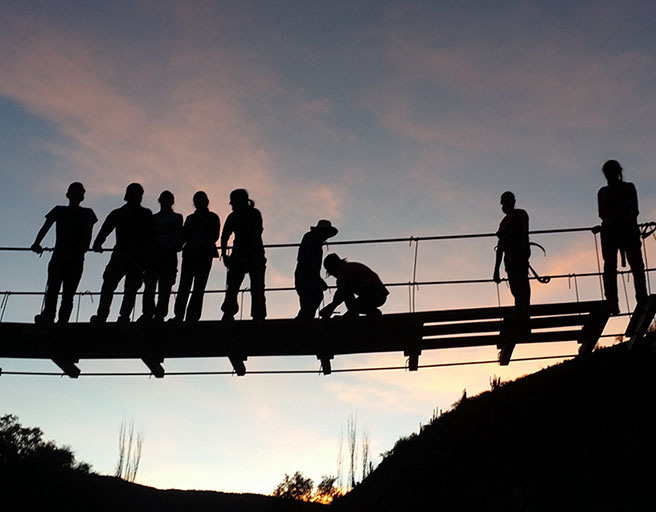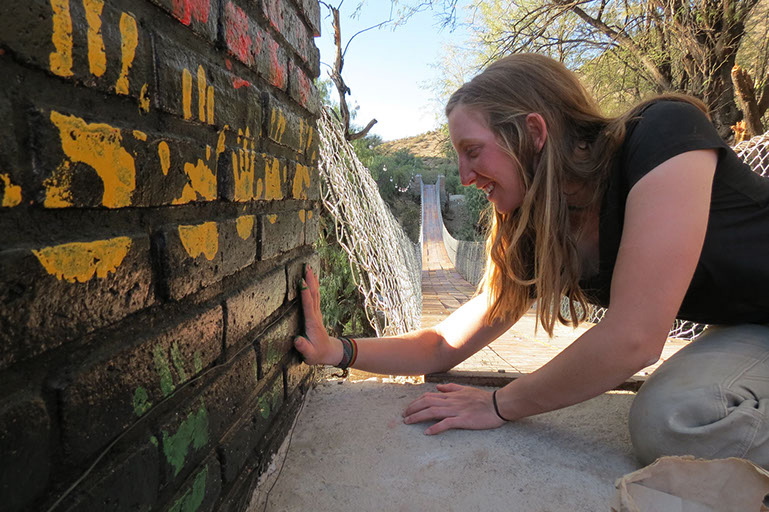Engineering students build bridge, friendships in Bolivia
By Tom Fleischman

Eight Cornell undergraduates, representing the Engineers Without Borders-Cornell Student Chapter, traveled to Bolivia over summer break for a bridge-building project in a tiny village in the southwest corner of South America’s poorest nation.
The team, led by mechanical engineering major Nathalie DeNey ’18, built a 165-foot-long suspension bridge made of concrete, steel cable and wood. The bridge spans the Vitichi River and connects the village of Calcha with its agricultural crops as well as a neighboring town – important particularly during the rainy season, when the river becomes dangerous to ford.
Over the two months, the team also built other things – relationships – that they hope will be just as enduring in the remote village, 200 miles south of the Bolivian capital city of La Paz.
“It was an adventure to be down there for eight weeks, and it was really worth it,” DeNey said. “The lasting friendships that we formed from being there for an extended period of time were incredible. We’re still in contact with a lot of them; occasionally, they get internet access so we have Facebook friends in Calcha.”
Other EWB-Cornell travel team members included mechanical engineering major Jonathan Mabuni ’16, environmental engineering major Susan McGrattan ’17, and civil engineering majors Joseph Ienna ’17, Meriel Engrand ’18, Mario Saldana ’18, Bethany Schull ’18 and Anna Sofia Montoya-Olsson ’19.
“These students brought to fruition a permanent structure and lasting goodwill to a well-deserving community who worked alongside and opened their homes,” said Rebecca Macdonald, the Swanson Director of Engineering Student Project Teams. “Their motivation and commitment drove the project, with Cornell faculty, staff and alumni, along with family and friends, providing the support necessary to pull it off.”
Cornell began its affiliation with Engineers Without Borders during the 2011-12 academic year, and for the last two years has collaborated with Engineers In Action (EIA), a nonprofit based in the U.S. that provides logistical and other support to engineering teams traveling to Bolivia for projects such as Cornell’s bridge build.
Rod Beadle, executive director of EIA and a registered professional civil engineer, said the work teams like Cornell’s EWB group perform is important for communities like Calcha, where 98 percent of the population lives on less than $2 a day, according to the EIA website.
“It’s very common for many communities in the developing world to be on the banks of a river or stream that may bisect the community, or separate the community from its schools or agricultural fields,” Beadle said. “When you get heavy flooding, for long periods people’s access to all sorts of things can be cut off.”
Arrived in mid-June
The team arrived in Bolivia in mid-June and got right to work, digging the foundations for the concrete anchors on both sides of the river, from which their bridge would be suspended.
“We spent our entire first week just excavating,” DeNey said, “and after that, it seemed like we were constantly mixing concrete. There wasn’t a day that went by where we weren’t mixing concrete.”
Most of that mixing was done by hand, until the team was able to run electricity from town to the Calcha side of the river. They borrowed a small cement mixer and were able to mix concrete for part of the project.
McGrattan said a typical day included rising for breakfast at around 7:30 a.m., arriving at the work site at 8:30 or 9 and working till lunch at noon. Then after a siesta break, work would resume at 2 p.m. and last until 6.

Both DeNey and McGrattan said one of the biggest highlights of the project was installing the crossbeams onto the tensioned cables, prior to attaching the decking boards to the structure. Being suspended approximately 16 feet above the river, kicking crossbeams out onto the cables, “was amazing,” DeNey said.
“We put people in harnesses, and we got to kick the beams across,” DeNey said. “We’re just holding onto the handrail cable, walking out across on one of the walkway cables.”
“You’ve been digging these holes, mixing concrete for so long,” McGrattan said. “And then actually getting to put the wood out on the bridge and have it actually become a bridge, it was just very exciting.”
Both women said the most off-hours fun they had was on the Fourth of July. The group painted their faces red, white and blue and had a bonfire and s’mores. Their cook also did her best to make them feel at home, with her version of hamburgers.
“That was really nice,” McGrattan said. “It was nice to get a feel for home after being there for a few weeks.”
Hoping to return
EWB-Cornell is returning to Bolivia next year for a water project, but neither DeNey nor McGrattan is planning on making that trip. They do, however, hope to get back to Calcha one day and see how their bridge has affected their new friends.
“The structure should be there for decades to come,” DeNey said. “And as we were finishing it, we were all talking about how cool it would be to come down in 10 years and see the bridge, see firsthand how it’s impacted the people there.”
Beadle said he’s impressed by student groups’ willingness to sacrifice a portion of their summer break to do meaningful work thousands of miles from home. And as most college groups spend just a week or two, he said, Cornell’s team deserves particular praise for devoting two months to their project.
“I always tell people that, as cynical as we get about kids these days, this generation is just so much more engaged and willing to do things that our generation just didn’t or couldn’t,” he said. “And to take eight weeks out of your summer, you’re not getting paid for it … it says an awful lot that they’re willing to do that.”
Media Contact
Get Cornell news delivered right to your inbox.
Subscribe